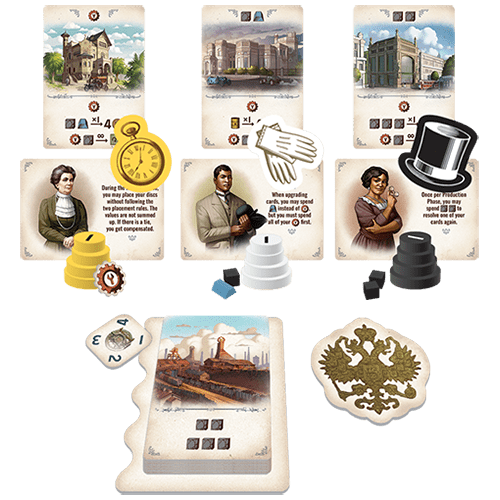Furnace was one of the big hits of Gen Con in 2021, earning a big crowd around the two booths demoing it (Arcane Wonders is the U.S. distributor and had copies for sale, while the original publisher, Hobby World, offered demos). It’s a brilliant game that combines resource trading with engine-building over four rounds, with some simultaneous actions that can keep game play to 30-40 minutes once everyone knows the game. If you’ve played Century Spice Road, Furnace takes that game’s main feature and builds a way better game around it – and I like CSR quite a bit. Furnace is out of stock at amazon now but I believe another printing is coming.
In Furnace, players will bid on cards from a central market and add the ones they win to their own play areas, where they will create engines of card actions they’ll execute in order, one card at a time, to try to convert resources into other resources and eventually into money. Furnace’s most notable new mechanic is that there is value in losing the bid for a card: If you bid on a card but don’t win it, you get “compensation,” which is shown at the top of that card, separate from the card’s actions (shown on the bottom). Compensation can be straight resources, or the right to convert resources you already own into others. You get that compensation multiplied by the value of your losing bid, which can be up to 3 – so if you bid 3 and lost, you triple the resource gains, or get to do the conversion up to three times. Thus you will often bid on cards you intend to lose, or will bid on cards hoping someone else will outbid you.

The bidding is independent of your cash and your resources; each player has four tokens, numbered 1 through 4, that they bid on the cards in the display. Players go around the table, bidding one token per turn, until everyone has used all of their tokens. After the bidding is completed and players receive the cards they won or compensation they receive, they place those cards in their play area, next to the cards they already have – the basic game lets you reorder the cards every turn, but I prefer the advanced rule where you must keep them in a row and can’t re-order the ones you already have – executing the actions on those cards, top to bottom on each card, then left to right. You repeat these steps over four rounds, and the game ends.
The cards you acquire all have at least one action available now, and each has one action that is shown only in outline at the bottom. That action is available after you upgrade the card, which requires an upgrade token and an upgrade action, both of which are shown on every player’s start card; you can upgrade as many cards with that action as you have available tokens. The resource exchanges are always in your favor, as in CSR, so the only reason you might choose not to use one of those actions is later in the game when you won’t have a chance to cash out the second resource type. Early in the game, at least, it’s usually a good idea to convert everything you can, and then tailor your bids in the next round to whatever resources you seem to have and are able to generate.
The game also has five Capitalist cards that you can distribute randomly that give every player a special ability throughout the game, such as an extra value-2 token for bidding, or the ability to gain extra compensation when losing a bid. There’s a fair dispute among players about whether these cards are balanced enough, but they also aren’t necessary to play or enjoy the game.
Furnace is easily one of the best games of 2021, and has the advantage of being accessible, both in terms of rules and playing time, while also presenting players with sufficient challenge for even more experienced gamers. There’s some randomness in the card draws – when I taught my parents at Thanksgiving, we had an unfortunate first round where almost none of the eight cards in the market offered resources as compensation, so everyone got off to a slower start – but after that, it’s all up to you. It’ll certainly end up in my top 10 for the year, which is scheduled to run next week over at Paste.
Keith, what would you rate this one on your 10.0 scale? I just got Nidavellir, how would you rate that one, too?
Both are 9.0 for me. I don’t own Nidavellir (yet), but have played it once live and several times online. It’s tremendous, although I am in the camp that says Uline is too powerful.